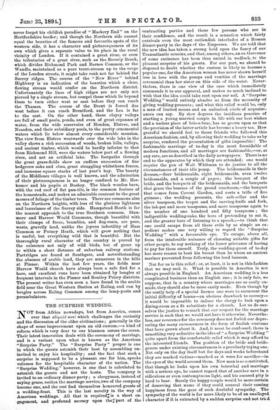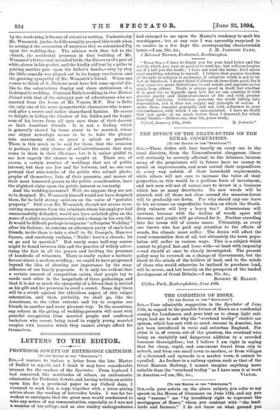THE SURPRISE WEDDING.
NOT from Africa nowadays, but from America, comes ever that aliguid nevi, which challenges the curiosity and the discussion of the older civilisations ; generally in the shape of some improvement upon an old custom,—a kind of reform which is very dear to our kinsmen across the ocean. Their latest innovation deals with the ceremony of marriage, and is a variant upon what is known as the American "Surprise Party." The "Surprise Party" proper is one in which the guests astonish their host by assembling un- invited to enjoy his hospitality; and the fact that such a -surprise is supposed to be a pleasant one for him, speaks volumes for the hospitable character of the nation. The -"Surprise Wedding," however, is one that is calculated to astonish the guests and not the hosts. The company is invited to an ordinary dinner-party ; a clergyman, instead of saying grace, recites the marriage service, two of the company 'become one; and the rest find themselves honoured guests of a wedding-feast. This is the last novelty in the way of American weddings. All that is required: is a short en- gagement, and profound secrecy upon therpart of the contracting parties and those few persons who are in their confidence, and the result is a sensation which fairly ontrivals even the most outlandish interludes of a Roman dinner-party in the days of the Emperors. We are told that the new idea has taken a strong hold upon the fancy of our Transatlantic cousins, and that, among others, an ex-Governor of some eminence has been thus united in wedlock, tc the pleasant surprise of his guests. For our part, we should be disposed to doubt whether the custom is likely to become a popular one, for the American woman has never shown herself less in love with the pomps and vanities of the marriage ceremonial than her sister on this side of the water. Never- theless, there is one view of the case which immediately commends it to our approval, and makes us much inclined to wish that the idea could take root upon our soil. A" Surprise Wedding" would entirely absolve us from the necessity of giving wedding-presents ; and what this relief would be, only a man of limited means and an unlimited circle of acquaint- ances can say. By slow degrees the insidious practice of starting a young married couple in life with our best wishes and a useless piece of bric-a-brac, has so grown upon us that the provision of the latter article has become a heavy tax. How grateful we should feel to those friends who followed this American fashion, and, by allowing their wedding to take us by surprise, rendered the presentation of gifts impossible ! The fashionable marriage of to-day is the most formidable of modern functions, and all marriages are fashionable,—or, at any rate, are so described in the daily newspapers. There is no end to the apparatus by which they are attended; one would require the pen of Walt Whitman to do justice to all the circumstances of their idle pomp. The bridesmaids in their dresses,—four bridesmaids, eight bridesmaids, even twelve bridesmaids, and 4 couple of pages ; the bouquet of the bride, and the bouquets of the bridesmaids, and the bouquets that grace the bosoms of the proud coachmen,—the bouquet that comes from Covent Garden, and costs a trifle of five guineas ; the wedding presents, the salt-cellar and the silver teaspoon, the teapot and the carving-knife and fork, the ink-pot and more teaspoons, and more teaspoons again to the number of one hundred and fifty teaspoons ; the indigestible wedding-cake, the bore of pretending to eat it, and the greater bore of listening to a speech ;—to think that one could escape from all these evils by so simple an ex- pedient makes one very willing to regard the "Surprise Wedding" with a favourable eye. To escape, above all, from the intolerable nuisance of choosing suitable gifts for other people, to say nothing of the lesser grievance of having to pay for them oneself. Truly, the wedding-guest of to-day has more reason to beat his breast than he whom an ancient mariner prevented from following the loud bassoon.
Not for us is this relief; or, at least, it is not in this fashion that we may seek it. What is possible in America is not always possible in England. An American wedding is a less complicated business than an English one ; it is only fair, we suppose, that in a country where marriages are so easily un- made, they should also be more easily made. Even though by the costly help of a special licence one were to surmount the initial difficulty of banns—an obvious drawback to secrecy— it would be impossible to induce the clergy to look upon a dining-room as a fit substitute for a church. Let us do our- selves the justice to remark that our respect for the marriage service is such that we would not have it otherwise. Neverthe- less, our reverence for the ceremony does not forbid our depre- cating the many excrescences in the form of foolish customs that have grown about it. And, it must be confessed, there is something very seductive in the idea of " a Surprise Wedding" quite apart from the comfortable relief which it may afford to the interested friends. The position of the bride and bride- groom under existing circumstances is a peculiarly trying one. Not only on the day itself but for days and weeks beforehand they are marked victims—marked as it were for sacrifice—in the eyes of the world around them. Now man is so constituted, that though he looks upon his own betrothal and marriage with a serious eye, he cannot regard that of another save in a ridiculous or even contemptuous light, and his amused pity is hard to bear. Surely the happy couple would be more certain of deserving that name if they could conceal their coming happiness from the gaze of such doubtful sympathy. The sympathy of the world is far more likely to be of an unalloyed character if it is extracted by a sudden surprise and not tritd by the weakening influence of attentive waiting. Undoubtedly Mr. Wemmick, junior, had thoroughly grasped this truth when he arranged the succession of surprises that so astonished Pip upon his wedding-day. The aimless walk that led to the church, the accidental presence in that building of Mr. Wemmick's father and intended bride, the discovery of a pair of white gloves in his pocket, and the kindly aid lent by a pillar in putting another pair upon his father's bands,—step by step the little comedy was played out to its happy conclusion, and the growing sympathy of Mr. Wemmick's friend. When one comes to think of it, Dickens must have felt some special dis- like to the ostentatious display and sham enthusiasm of a fashionable wedding. Contrast Bella's wedding in Our Mutual Friend with that of the unhappy pair of adventurers who are married from the house of Mr. Veneer, M.P. Nor is Bella the only one of his more sympathethic characters who is mar- ried after a secret and rather shamefaced fashion. He seems to delight in hiding the blushes of his brides and the happi- ness of his lovers from all eyes save those of their dearest or their humblest friends. It is not a feeling which is generally shared by those about to be married, whose one object nowadays seems to be to take the plunge into matrimony with as great a splash as possible. There is this much to be said for them, that the occasion is perhaps the only chance of self-advertisement that may come to them in their life-time ; but it is rather pitiful to see how eagerly the chance is caught at. There are, of course, a certain number of weddings that are of public interest, but they are few and far between, and no one can pretend that nine-tenths of the public who submit photo- graphs of themselves, lists of their presents, and names of their most honoured guests to the public consideration, have the slightest claim upon the public interest or curiosity.
And the wedding-presents? Well, we suppose they are not to be despised. Mr. Wemmick himself would not have despised them, for he held strong opinions on the value of "portable property." Still even Mr. Wemmick, though not averse to re- ceiving mementoes from the criminals whom his employer had unsuccessfully defended, would not have solicited gifts on the score of a slight acquaintanceship and a change in his own life. It would be difficult perhaps to organise "a Surprise Wedding" after his fashion; to convene an afternoon party of one's best friends, invite them to take a stroll to St. George's, Hanover Square, and carelessly exclaim, " Hullo ! here's a church; let us go and be married." But surely some half-way course might be found between this and the practice of widely adver- tieing the fact in all the papers and inviting the presence of hundreds of witnesses. There is really rather a barbaric flavour about a modern wedding; we ought to have progressed beyond the idea of showing our importance by the mag- nificence of our family pageants. It is only too evident that a certain amount of competition exists, that people try to outdo each other in the magnitude of these gatherings, and that it is not so much the sympathy of a friend that is invited as his gift and his presence to swell a crowd. Some day there will be a revolt against the ridiculous aspect of this vulgar ostentation, and then, probably, we shall go, like the Americans, to the other extreme and try to surprise our friends in another and more pleasant way. In the meantime, any reform in the giving of wedding-presents will meet with grateful recognition from married people and confirmed bachelors who resent being taxed to supply young married couples with luxuries which they cannot always afford for themselves.



































 Previous page
Previous page